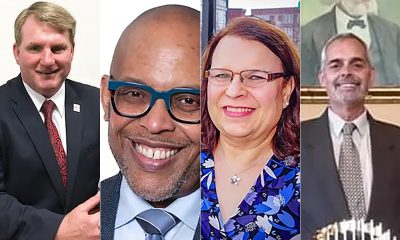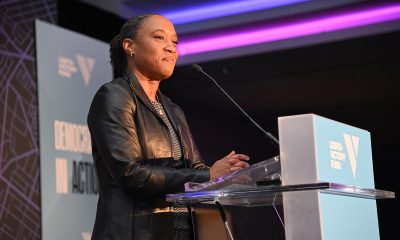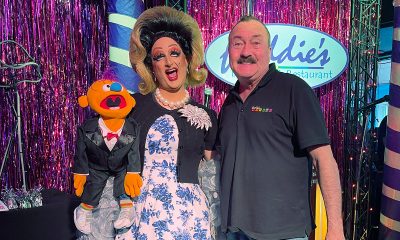a&e features
QUEERY: Sean Holihan
The RAINN policy manager answers 20 queer questions
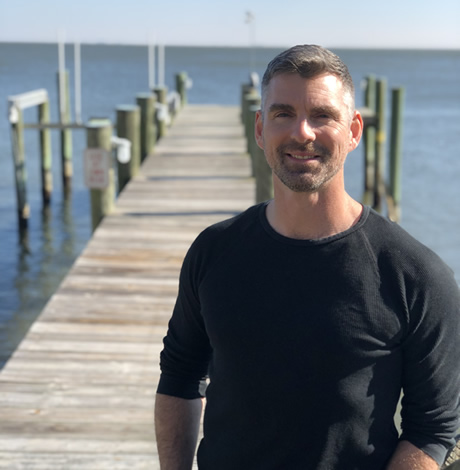
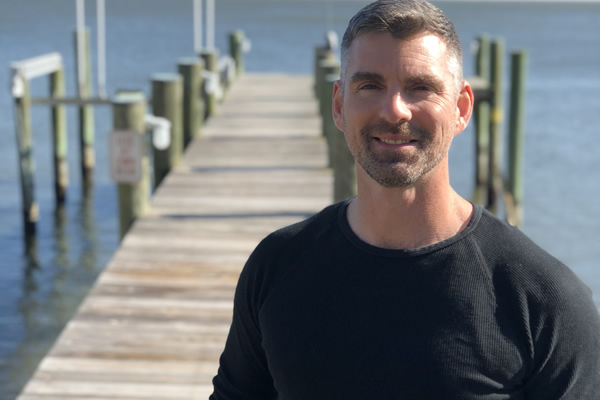
Editor’s note: Doing something interesting or creative during lockdown? The Blade is always looking for compelling Queery subjects. To be eligible, the subject must be a D.C.-area resident, openly LGBTQ and someone who’s never previously done it. Trans folks, queer women and people of color are especially desired. Send Queery suggestions to Features Editor Joey DiGuglielmo at [email protected] and you or a friend could be in an upcoming issue!
For more than 25 years, RAINN (Rape, Abuse & Incest National Network) has provided critical support to survivors and their loved ones through the National Sexual Assault Hotline (800-656-HOPE or rainn.org).
As the primary provider of services in the U.S., RAINN takes a survivor-centered, trauma-informed approach to developing programs and services that support survivors of sexual violence and their loved ones and works to end sexual violence in all its forms.
After working with Camille Cooper, RAINN’s vice president of policy, for more than a decade, Sean Holihan “jumped at the chance” to join the staff as policy manager just over a year ago.
Although RAINN does not track the sexual orientation of its callers, HRC has said LGBTQ youth are twice as likely to have experienced sexual dating violence or physical dating violence and that “many” of its callers are queer. The coronavirus lockdown is likely exacerbating the issue, Holihan says.
“For children quarantined with their abusers, stay-at-home orders have exacerbated abuse they are experiencing,” the 39-year-old Norfolk, Va., native says. “History has shown that sexual and domestic violence actually increase during times of crisis or natural disasters, but because many victims are stuck at home, unable to get away from an abuser or even report that the abuse is happening, sexual assault exams are down during this time. Once stay-at-home orders are lifted across the country, we expect to see a large increase of reports, as well as calls to the National Sexual Assault Hotline and are working to ensure we can be there to support survivors at this crucial time.”
RAINN was started by Scott Berkowitz in 1994. Singer/songwriter Tori Amos was RAINN’s first spokesperson and continues to be involved.
Holihan worked previously as a communications and policy consultant with his husband, Danny Barefoot, at their small firm. Holihan came to Washington 11 years ago to work with the Democratic Party.
He’s been isolating at home during the pandemic and says, “I’ve accepted that I can’t change what’s happening.”
Highly active in D.C. gay social circles, Holihan says he’s known “a handful” of friends and acquaintances who’ve had COVID-19 but “thankfully they’ve all recovered by now.”
He lives in Shaw and enjoys baseball, video games, his cats, Pokemon Go and “binge watching old seasons of ‘Drag Race’” in his down time.
How long have you been out and who was the hardest person to tell?
I came out when I was 17 as bisexual to my mom. All she said was, “Yeah sure, bi now, gay later.” Never loved that sentiment, but she wasn’t wrong.
Who’s your LGBTQ hero?
Bayard Rustin. He was an out gay man who spent more than two years in prison as a conscientious objector to the draft, participated in the first Freedom Rides, helped desegregate the Armed Forces and worked alongside MLK Jr. for equality. This man is a legend.
What LGBTQ stereotype most annoys you?
I think I hate the idea that all gays are exclusive and mean to each other. Anyone and everyone CAN be mean to each other. However, if anything, I’ve found D.C. to be a great place for new people to make a family of their own.
What’s your proudest professional achievement?
Over the years I’ve worked to help pass legislation that helped out-of-work fishermen create new careers as ship builders (long story), help people get protective orders against their abuser and ensure that victims of sexual assault had access to medical help.
What terrifies you?
Being alone in this world. I saw my Uncle Bobby suffer and die from AIDS when I was a kid. He passed without anyone to care for him except for my mom. It terrified me and made me think that’s what living my life as an openly gay man held in store. I’m happy to say my life has turned out differently, but it’s something that I still fear.
What’s something trashy or vapid you love?
Miller Lite and the arcade game Buck Hunter.
What’s your greatest domestic skill?
I am a pretty decent bartender.
What’s your favorite LGBTQ movie or show?
Movie: “But I’m a Cheerleader” still holds up despite coming out in 1999. TV show: “Six Feet Under.”
What’s your social media pet peeve?
People commenting on other people’s posts or tweets just to be a jerk. Why engage? Just keep scrolling.
What would the end of the LGBTQ movement look like to you?
A completely trans-inclusive country.
What’s the most overrated social custom?
Right now, I guess I’d have to say shaking hands when you greet someone.
What was your religion, if any, as a child and what is it today?
I was baptized as a Methodist to get back at my Catholic grandparents. My grandparents made my mom marry my dad right before I was born to avoid the shame of having a baby out of wedlock. My parents divorced five years later and I haven’t been religious in a long, long time.
What’s D.C.’s best hidden gem?
So’s Your Mom in Adams Morgan makes amazing sandwiches. Just give them your cash and get out because they don’t take cards and you can’t eat inside.
What’s been the most memorable pop culture moment of your lifetime?
Gathering with my first group of gay friends in Virginia Beach, Va., to watch “Queer as Folk” before heading out to this bar called Ambush is probably something that will always stick with me.
What celebrity death hit you hardest?
I moved around a lot as a kid and instead of playing outside, I would watch a ton of “Saturday Night Live” reruns. I absolutely loved Phil Hartman. Hearing about his death hit me hard.
If you could redo one moment from your past, what would it be?
I dropped out of college to drive cross country and live in Berkeley for a short time with my brother and sister. It wasn’t even that fun.
What are your obsessions?
This is going to sound so hokey but it’s the people around me. I have an amazing group of people around me and I’m incredibly lucky to have them in my life. Not being able to see all of them at this time is a big reminder of that.
Finish this sentence — It’s about damn time:
… baseball comes back.
What do you wish you’d known at 18?
To aim higher. It took me until I was 25 to realize I wanted to do more with my life than just scrape by.
Why Washington?
The most passionate group of people I’ve ever met.
a&e features
Juliet Hawkins’s music defies conventional categorization
‘Keep an open mind, an open heart, and a willingness to evolve’
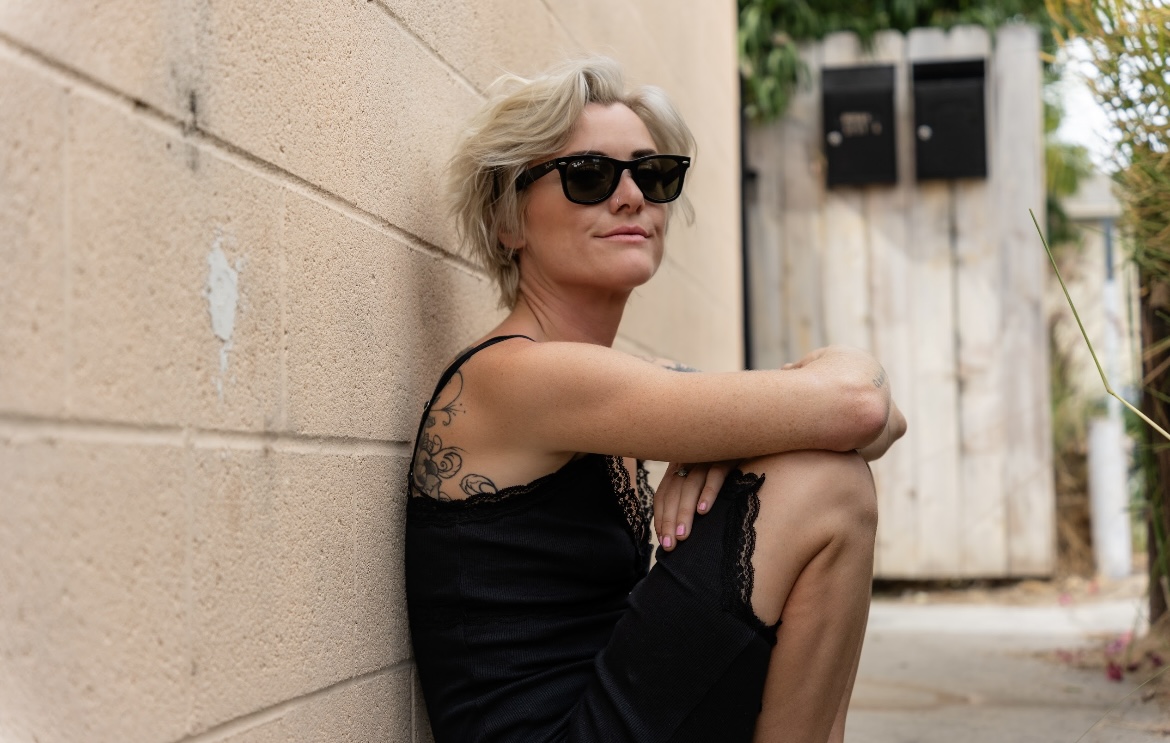
LONG BEACH, Calif. – Emerging from the dynamic music scene of Los Angeles, Juliet Hawkins seamlessly integrates deeply soulful vocals with contemporary production techniques, crafting a distinctive sound that defies conventional categorization.
Drawing inspiration from the emotive depth of Amy Winehouse and weaving together elements of country, blues, and pop, Hawkins’ music can best be described as a fusion–perhaps best termed as soulful electronica. Yet, even this characterization falls short, as Hawkins defines herself as “a blend of a million different inspirations.”
Hawkins’s musical palette mirrors her personae: versatile and eclectic. Any conversation with Hawkins makes this point abundantly clear. She exhibits the archetype of a wild, musical genius while remaining true to her nature-loving, creative spirit. Whether recording in the studio for an album release, performing live in a studio setting, or playing in front of a live audience, Hawkins delivers her music with natural grace.
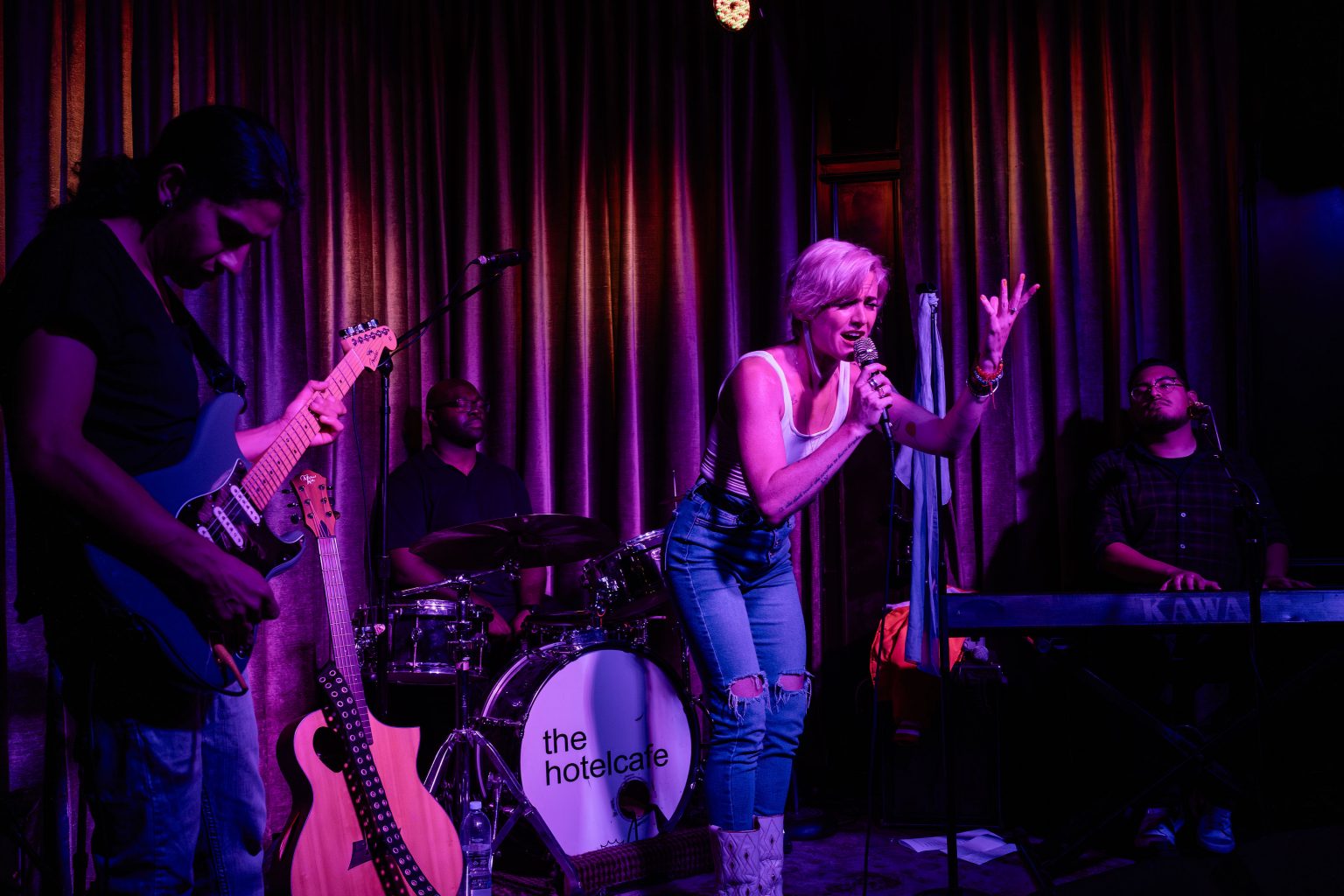
However, Hawkins’s musical journey is far from effortless. Amid personal challenges and adversity, she weaves her personal odyssey of pain and pleasure, transforming these experiences into empowering anthems.
In a candid interview with the Blade, Hawkins spoke with profound openness and vulnerability about her past struggles with opiate and heroin addiction: “That was 10 years ago that I struggled with opiates,” she shared. Yet, instead of letting her previous addiction define her, Hawkins expressed to the Blade that she harbors no shame about her past. “My newer music is much more about empowerment than recovery,” she explained, emphasizing that “writing was the best way to process trauma.”
Despite her struggles with addiction, Hawkins managed to recover. However, she emphasizes that this recovery is deeply intertwined with her spiritual connection to nature. An illustrative instance of Hawkins’ engagement with nature occurred during the COVID pandemic.
Following an impulse that many of us have entertained, she bought a van and chose to live amidst the trees. It was during this period that Hawkins composed the music for her second EP, titled “Lead with Love.”
In many ways, Hawkins deep spiritual connection to nature has been profoundly shaped by her extensive travels. Born in San Diego, spending her formative years in Massachusetts, and later moving to Tennessee before returning to Southern California, she has broadened her interests and exposed herself to the diverse musical landscapes across America.
“Music is the only thing I have left,” Hawkins confides to the Blade, highlighting the integral role that music has in her life. This intimate relationship with music is evident in her sultry and dynamic compositions. Rather than imitating or copying other artists, Hawkins effortlessly integrates sounds from some of her favorite musical influences to create something new. Some of these influences include LP, Lucinda Williams, Lana Del Rey, and, of course, Amy Winehouse, among others.
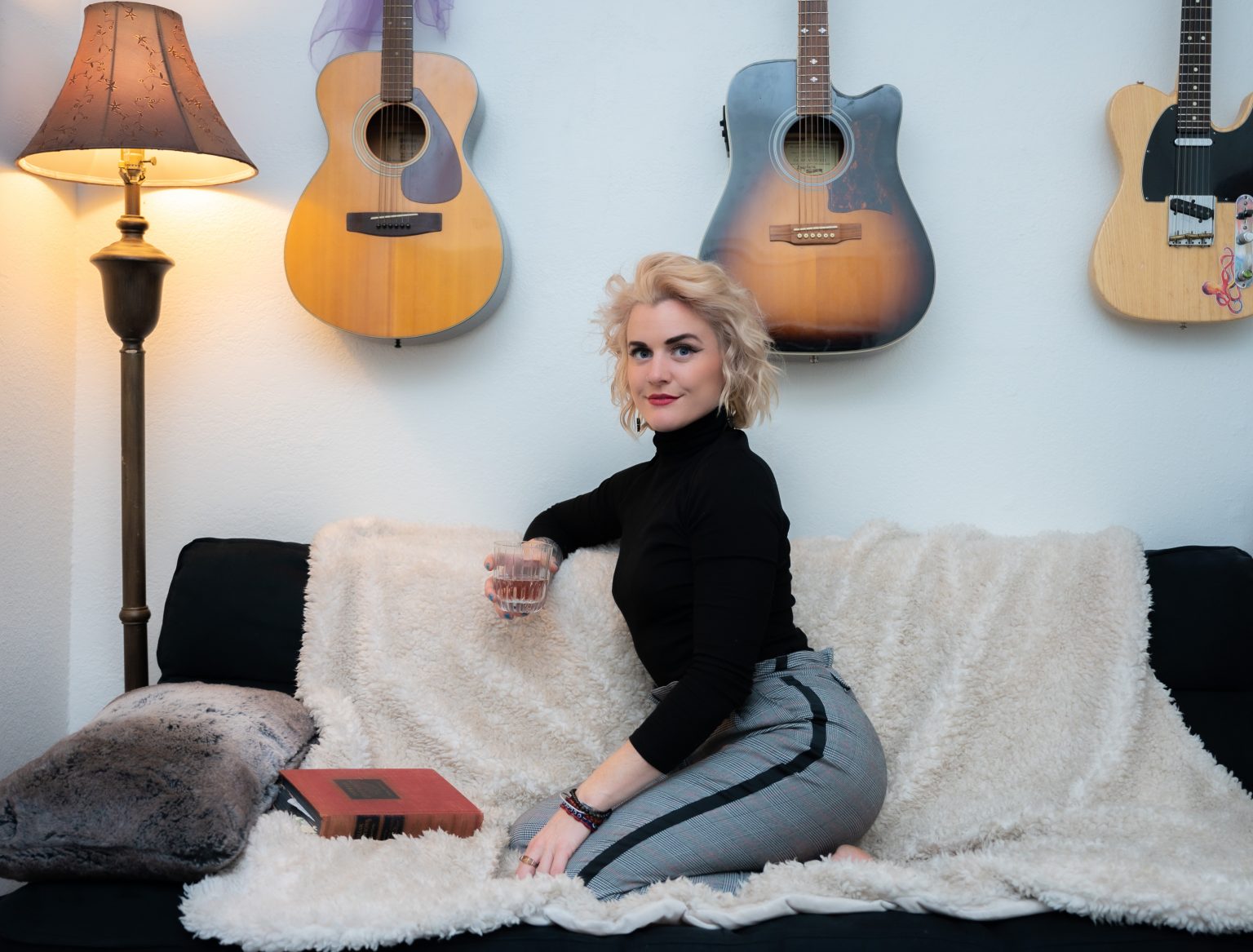
Hawkins has always been passionate about music—-she began with piano at a young age, progressed to guitar, and then to bass, eagerly exploring any instrument she could get her hands on. However, instead of following a traditional path of formalized lessons and structured music theory, Hawkins told the Blade that she “has a hard time following directions and being told what to do.”
This independent approach has led her to experiment with various genres and even join unexpected groups, such as a tribute band for Eric Clapton and Cream. While she acknowledges that her eclectic musical interests might be attributed to ADHD, she holds a different belief: “Creative minds like to move around.”
When discussing her latest musical release — “Stay True (the live album)” which was recorded in a live studio setting — Hawkins describes the experience as a form of improvisation with both herself and the band:
“[The experience] was this divine honey that was flowing through all of us.” She explains that this live album was uncertain in the music’s direction. “For a couple of songs,” Hawkins recalls, “we intuitively closed them out.” By embracing creative spontaneity and refusing to be constrained by fear of mistakes, the live album authentically captures raw sound, complete with background chatter, extended outros, and an extremely somber cover of Ozzy Osbourne’s “Crazy Train” coupled with a slow piano and accompanied strings.
While “Stay True” was a rewarding experience for Hawkins, her favorite live performance took place in an unexpected location—an unattended piano in the middle of an airport. As she began playing Beethoven’s “Moonlight Sonata”, Hawkins shared with the Blade a universal connection we all share with music: “This little girl was dancing as I was playing.”
After the performance, tears welled in Hawkins’ eyes as she was touched by the young girl’s appreciation of her musicianship. Hawkins tells the Blade, “It’s not about playing to an audience—it’s about finding your people.”
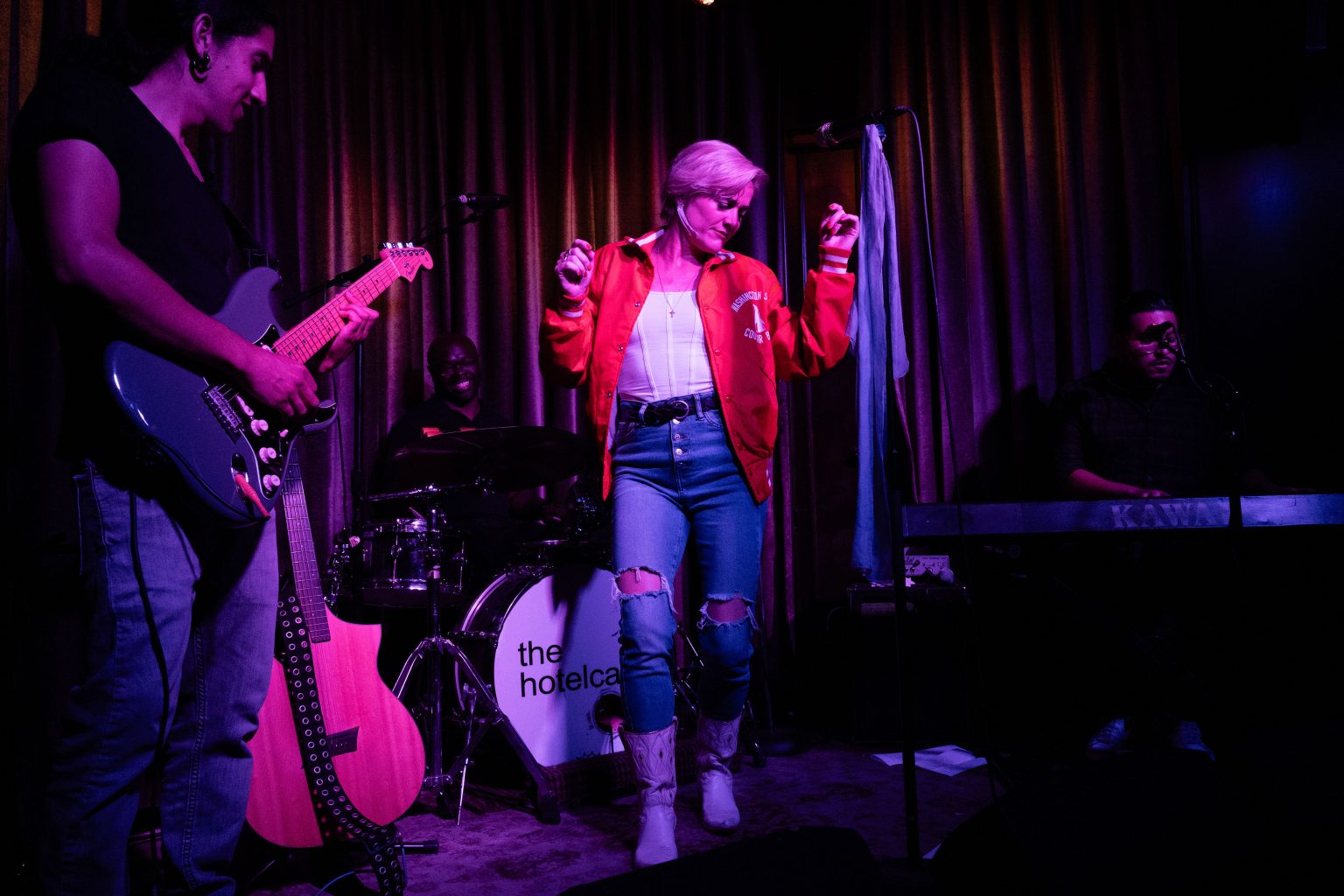
What sets Hawkins apart as an artist is her ability to connect with her audience in diverse settings. She highlights EDC, an electronic dance music festival, as a place where she unabashedly lets her “freak flag” fly and a place to connect with her people. Her affinity for electronic music not only fuels her original pop music creations, but also inspires her to reinterpret songs with an electronic twist. A prime example of this is with her electronic-style cover of Tal Bachman’s 90’s hit, “She’s So High.”
As an openly queer woman in the music industry, Hawkins is on a mission to safeguard artistic integrity. In songs like “My Father’s Men,” she bares her vulnerability and highlights the industry’s misogyny, which often marginalizes gender minorities in their pursuit of artistic expression.
She confides to the Blade, “The industry can be so sexist, misogynist, and oppressive,” and points out that “there are predators in the industry.” Yet, rather than succumbing to apathy, Hawkins is committed to advocating for gender minorities within the music industry.
“Luckily, people are rising up against misogyny, but it’s still there. ‘My Father’s Men’ is a message: It’s time for more people who aren’t just white straight men to have a say.”
Hawkins is also an activist for other causes, with a fervent belief in the preservation of bodily autonomy. Her self-directed music video “I’ll play Daddy,” showcases the joy of embracing one’s body with Hawkins being sensually touched by a plethora of hands. While the song, according to Hawkins, “fell upon deaf ears in the south,” it hasn’t stopped Hawkins from continuing to fight for the causes she believes in. In her interview, Hawkins encapsulated her political stance by quoting an artist she admires:
“To quote Pink, ‘I don’t care about your politics, I care about your kids.’”
When Hawkins isn’t writing music or being a champion for various causes, you might catch her doing the following: camping, rollerblading, painting, teaching music lessons, relaxing with Bernie (her beloved dog), stripping down for artsy photoshoots, or embarking on a quest to find the world’s best hollandaise sauce.
But at the end of the day, Hawkins sums up her main purpose: “To come together with like-minded people and create.”
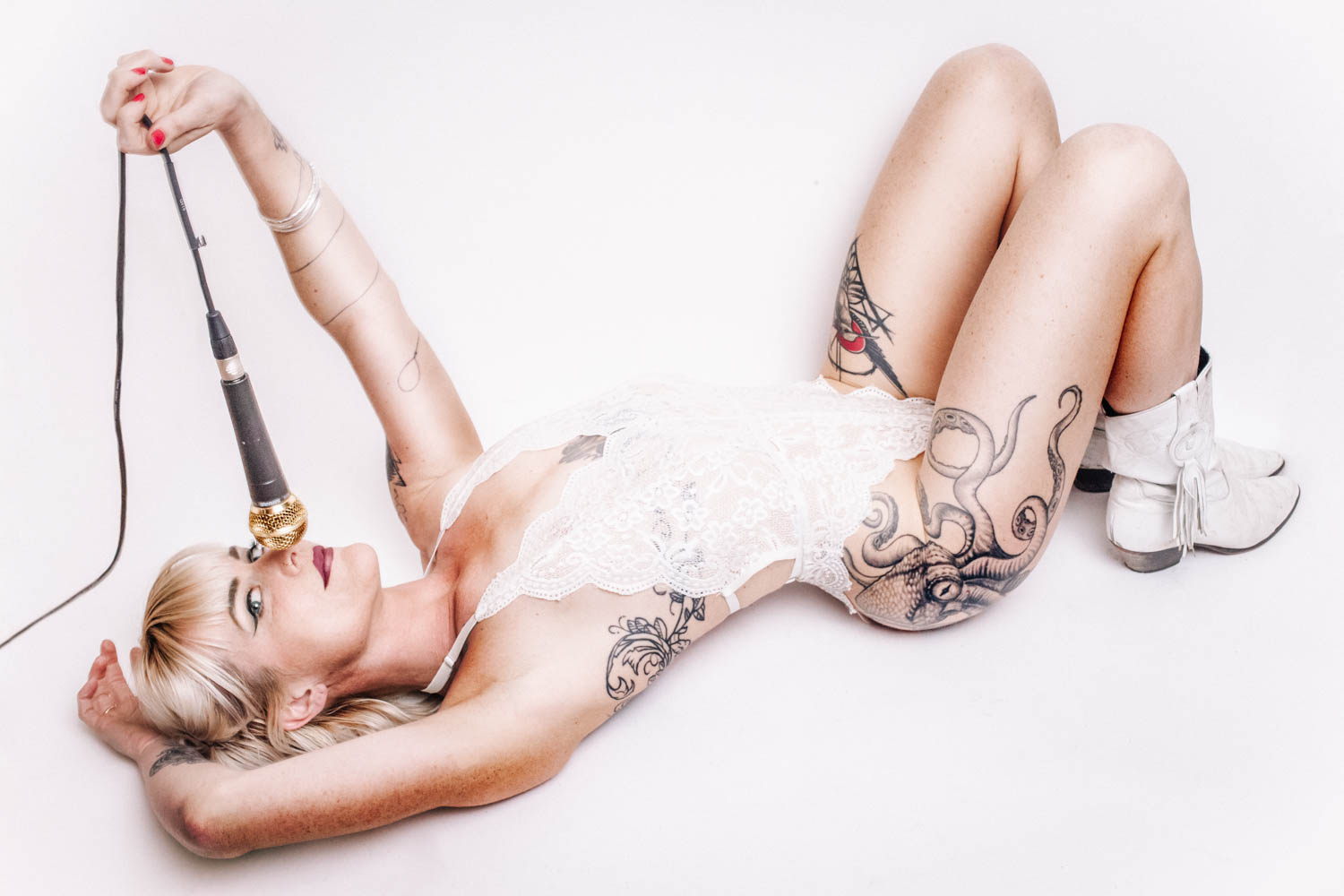
Part of this ever-evolving, coming-of-age-like journey includes an important element: plant-based medicine. Hawkins tells the Blade that she acknowledges her previous experience with addiction and finds certain plants to be useful in her recovery:
“The recovery thing is tricky,” Hawkins explains, “I don’t use opiates—-no powders and no pills—but I am a fan of weed, and I think psilocybin can be helpful when used at the right time.” She emphasizes the role of psychedelics in guiding her towards her purpose. “Thanks for psychedelics, I have a reignited sense of purpose … Music came naturally to me as an outlet to heal.”
While she views the occasional dabbling of psychedelics as a spiritual practice, Hawkins also embraces other rituals, particularly those she performs before and during live shows. “I always carry two rocks with me: a labradorite and a tiger’s eye marble,” she explains.
a&e features
Lavender Mass and the art of serious parody in protest
Part 3 of our series on the history of LGBTQ religion in D.C.
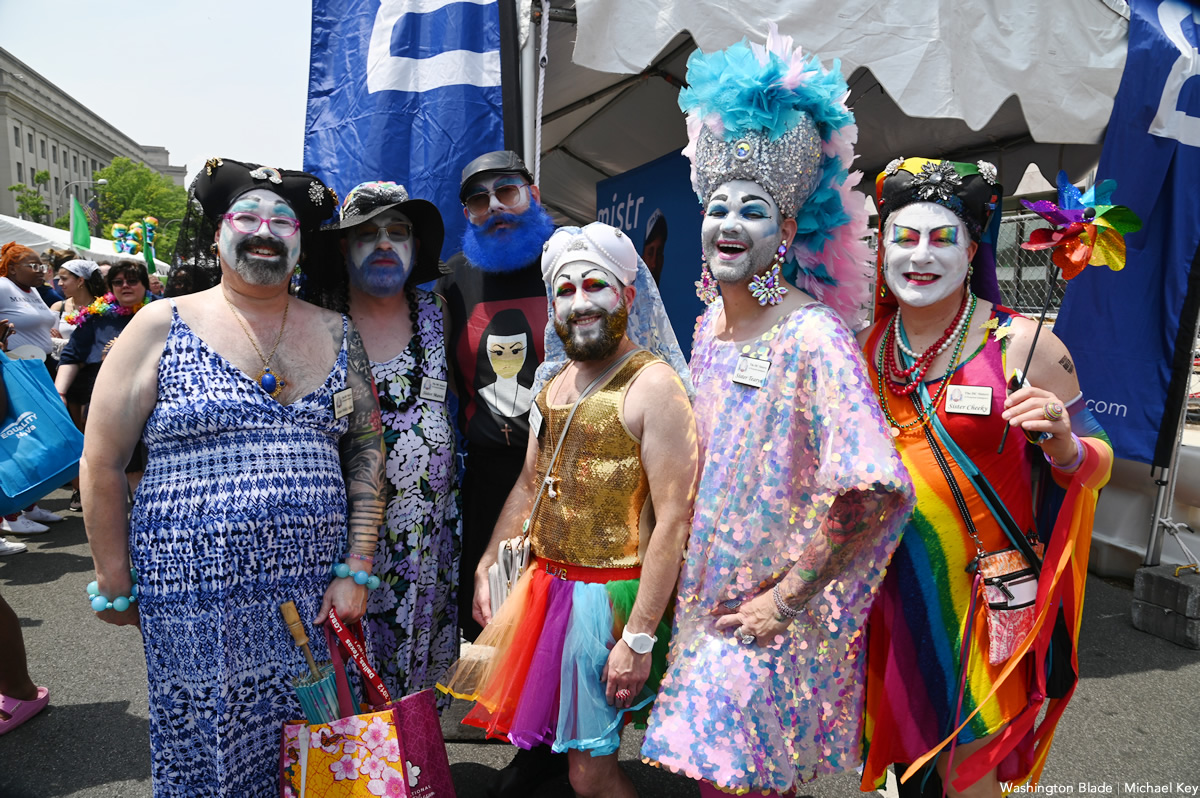
(Editor’s note: Although there has been considerable scholarship focused on LGBTQ community and advocacy in D.C., there is a deficit of scholarship focused on LGBTQ religion in the area. Religion plays an important role in LGBTQ advocacy movements, through queer-affirming ministers and communities, along with queer-phobic churches in the city. This is the final installment of a three-part series exploring the history of religion and LGBTQ advocacy in Washington, D.C. Visit our website for the previous installments.)
Six sisters gathered not so quietly in Marion Park, Washington, D.C. on Saturday, October 8, 2022. As the first sounds of the Women’s March rang out two blocks away at 11 am, the Sisters passed out candles to say Mass on the grass. It was their fifth annual Lavender Mass, but this year’s event in particular told an interesting story of religious reclamation, reimagining a meaningful ritual from an institution that seeks to devalue and oppress queer people.
The D.C. Sisters are a chapter of the Sisters of Perpetual Indulgence, an organization of “drag nuns” ministering to LGBTQ+ and other marginalized communities. What first began as satire on Easter Sunday 1979 when queer men borrowed and wore habits from a production of The Sound of Music became a national organization; the D.C. chapter came about relatively late, receiving approval from the United Nuns Privy Council in April 2016. The D.C. Sisters raise money and contribute to organizations focused on underserved communities in their area, such as Moveable Feast and Trans Lifeline, much like Anglican and Catholic women religious orders.
As Sister Ray Dee O’Active explained, “we tend to say we raise funds, fun, and hell. I love all three. Thousands of dollars for local LGBTQ groups. Pure joy at Pride parades when we greet the next generation of activists. And blatant response to homophobia and transphobia by protest after protest.” The Lavender Mass held on October 8th embodied their response to transphobia both inside and outside pro-choice groups, specifically how the overturn of Roe v. Wade in June 2022 intimately affects members of the LGBTQ+ community.
As a little history about the Mass, Sister Mary Full O’Rage, shown wearing a short red dress and crimson coronet and veil in the photo above developed the Lavender Mass as a “counterpart” or “counter narrative” to the Red Mass, a Catholic Mass held the first Sunday of October in honor Catholics in positions of civil authority, like the Supreme Court Justices. The plan was to celebrate this year’s Lavender Mas on October 1st at the Nuns of the Battlefield Memorial, located right across the street from the Cathedral of St. Matthew the Apostle, where many Supreme Court Justices attend the Red Mass every year.
As Sister Mary explained, this year “it was intended to be a direct protest of the actions of the Supreme Court, in significant measure their overturning of reproductive rights.”
Unfortunately, the October 1st event was canceled due to heavy rain and postponed to October 8th at the recommendation of Sister Ruth Lisque-Hunt and Sister Joy! Totheworld. The focus of the Women’s March this year aligned with the focus of the Lavender Mass—reproductive rights—and this cause, Sister Mary explained, “drove us to plan our Lavender Mass as a true counter-ritual and protest of the Supreme Court of who we expected to attend the Red Mass,” and who were protested in large at the Women’s March.
The “Lavender Mass was something that we could adopt for ourselves,” Sister Mary spoke about past events. The first two Masses took place at the Lutheran Church of the Reformation, right around the corner from the Supreme Court. The second Mass, as Sister Mary explained, celebrated Justice Ruth Bader Ginsburg; “we canonized her.” Canonization of saints in the Catholic Church also takes place during a Mass, a Papal Mass in particular.
During the COVID-19 pandemic, the Sisters moved the Mass outside for safety, and the third and fourth Masses were celebrated at the Nuns of the Battlefield Memorial. “It celebrates nuns, and we are nuns, psycho-clown nuns,” Sister Mary chuckled, “but we are nuns.” After the Mass, the Sisters would gather at a LGBTQ+ safe space or protest at the Catholic Church or Supreme Court. Although they often serve as “sister security” at local events, working to keep queer community members safe according to Sister Amore Fagellare, the Lavender Mass is not widely publicly advertised, out of concern for their own.
On October 8th, nine people gathered on the grass in a circle—six sisters, myself, and two people who were close with professed members—as Sister Mary called us to assemble before leading us all in chanting the chorus to Sister Sledge’s 1979 classic song “We Are Family.”
Next, novice Sister Sybil Liberties set a sacred space, whereby Sister Ruth and Sister Tearyn Upinjustice walked in a circle behind us, unspooling pink and blue ribbons to tie us together as a group. As Sister Sybil explained, “we surround this sacred space in protection and sanctify it with color,” pink for the choice to become a parent and blue for the freedom to choose not to be a parent but also as Sybil elaboration, in recognition of “the broad gender spectrum of people with the ability to become pregnant.” This intentional act was sought to fight transphobia within the fight for reproductive rights.
After singing Lesley Gore’s 1963 song “You Don’t Own Me,” six speakers began the ritual for reproductive rights. Holding out our wax plastic candles, Sister Sybil explained that each speaker would describe a story or reality connected to reproductive rights, and “as I light a series of candles for the different paths we have taken, if you recognize yourself in one of these prayers, I invite you to put your hand over your heart, wherever you are, and know that you are not alone – there is someone else in this gathered community holding their hand over their heart too.”
The Sisters went around the circle lighting a candle for those whose stories include the choice to end a pregnancy; those whose include the unwanted loss of a pregnancy or struggles with fertility; those whose include the choice to give birth, raise or adopt a child; those whose include the choice not to conceive a child, to undergo forced choice, or with no choice at all; those who have encountered violence where there “should have been tenderness and care;” and those whose reproductive stories are still being written today.
After each reading, the group spoke together, “may the beginnings and endings in our stories be held in unconditional love and acceptance,” recalling the Prayer of the Faithful or General Intercessions at Catholic Masswhere congregations respond “Lord, hear our prayer” to each petition. Sister Sybil closed out the ritual as Sister Mary cut the blue and pink ribbons between each person, creating small segments they could take away with them and tie to their garments before walking to the Women’s March. The Sisters gathered their signs, drums, and horns before walking to Folger Park together into the crowd of protestors.
At first glance, the Lavender Mass may appear like religious appropriation, just as the Sisters themselves sometimes look to outsiders. They model themselves after Angelican and Catholic women religious, in dress—they actively refer to their clothing as “habits,” their organization—members must also go through aspirant, postulant, and novice stages to be fully professed and they maintain a hierarchical authority, and in action. Like white and black habits, the Sisters all wear white faces to create a unified image and colorful coronets, varying veil color based on professed stage. Sister Allie Lewya explained at their September 2022 meeting, “something about the veils gives us a lot of authority that is undue,” but as the Sisters reinforced at the Women’s March, they are not cosplayers nor customers, rather committed clergy.
As such, the Sisters see their existence within the liminal spaces between satire, appropriation, and reimagination, instead reclaiming the basis of religious rituals to counter the power holders of this tradition, namely, to counter the Catholic Church and how it celebrates those in positions of authority who restrict reproductive rights. Similarly, the Lavender Mass is modeled after a Catholic or Anglican Mass. It has an intention, namely reproductive rights, a call to assemble, setting of a sacred space, song, chant, and prayer requests. It even uses religious terminology; each section of the Mass is ended with a “may it be/Amen/Awen/Ashay/aho.”
While this ritual—the Lavender Mass—appropriates a religious ritual of the Catholic Church and Anglican Church, this religious appropriation is necessitated by exclusion and queerphobia. As David Ford explains in Queer Psychology, many queer individuals retain a strong connection to their faith communities even though they have experienced trauma from these same communities. Jodi O’Brien builds on this, characterizing Christian religious institutions as spaces of personal meaning making and oppression. This essay further argues that the fact this ritual is adopted and reimagined by a community that the dominant ritual holder—the Catholic Church—oppressed and marginalized, means that it is not religious appropriation at all.
Religious appropriation, as highlighted in Liz Bucar’s recent book, Stealing My Religion (2022), is the acquisition or use of religious traditions, rituals, or objects without a full understanding of the community for which they hold meaning. The Sisters, however, fully understand the implications of calling themselves sisters and the connotations of performing a ritual they call a “Mass” as women religious, a group that do not have this authority in the Catholic Church. It is the reclamation of a tradition that the Sisters of Perpetual Indulgence understand because some were or are part of the Catholic Church.
Some sisters still seek out spiritual meaning, but all also recognize that the Catholic Church itself is an institution that hinders their sisters’ access and actively spreads homophobia and transphobia to this day. As such, through the Lavender Mass, the sisters have reclaimed the Mass as a tool of rebellion in support of queer identity.
Just as the Sisters recognize the meaning and power of the ritual of a Mass, along with the connotations of being a sister, the Lavender Mass fulfilled its purpose as a ritual of intention just as the Sisters fulfill public servants. “As a sister,” Sister Ruth dissected, “as someone who identifies as a drag nun, it perplexes people, but when you get the nitty gritty, we serve a similar purpose, to heal a community, to provide support to a community, to love a community that has not been loved historically in the ways that it should be loved.
The Sisters’ intentionality in recognizing and upholding the role of a woman religious in their work has been well documented as a serious parody for the intention of queer activism by Melissa Wilcox. The Lavender Mass is a form of serious parody, as Wilcox posits in the book: Queer Nuns: Religion, Activism, and Serious Parody(2018). The Mass both challenges the queerphobia of the Catholic Church while also reinforcing the legitimacy of this ritual as a Mass. The Sisters argue that although they would traditionally be excluded from religious leadership in the Catholic Church, they can perform a Mass. In doing so, they challenge the role that women religious play in the Catholic Church as a whole and the power dynamics that exclude queer communities from living authentically within the Church.
By reclaiming a tradition from a religious institution that actively excludes and traumatizes the LGBTQ+ community, the Lavender Mass is a form of religious reclamation in which an oppressed community cultivates queer religious meaning, reclaims a tradition from which they are excluded, and uses it to fuel queer activism (the fight for reproductive rights). This essay argues that the Lavender Mass goes one step further than serious parody. While the Sisters employ serious parody in their religious and activist roles, the Lavender Mass is the active reclamation of a religious tradition for both spiritual and activist ends.
Using the celebration of the Mass as it was intended, just within a different lens for a different purpose, this essay argues, is religious reclamation. As a collection of Austrian and Aotearoan scholars explored most recently in a chapter on acculturation and decolonization, reclamation is associated with the reassertion and ownership of tangibles: of rituals, traditions, objects, and land. The meaning of the Lavender Mass comes not only from the Sisters’ understanding of women religious as a social and religious role but rather from the reclamation of a physical ritual—a Mass—that has specific religious or spiritual meaning for the Sisters.
When asked why it was important to call this ritual a “Mass,” Sister Mary explained: “I think we wanted to have something that denoted a ritual, that was for those who know, that the name signifies that it was a counter-protest. And you know, many of the sisters grew up with faith, not all of them Catholics but some, so I think ‘Mass’ was a name that resonated for many of us.”
As Sister Ray said, “my faith as a queer person tends to ostracize me but the Sisters bring the imagery and language of faith right into the middle of the LGBTQ world.” This Lavender Mass, although only attended and experienced by a few of the Women’s March protests, lived up to its goal as “a form of protest that is hopefully very loud,” as Sister Millie Taint advertised in the Sisters’ September 2022 chapter meeting. It brought religious imagery and language of faith to a march for reproductive rights, using a recognized model of ritual to empower protestors.
The Lavender Mass this year, as always, was an act of rebellion, but by situating itself before the Women’s March and focusing its intention for reproductive rights, the Sisters’ reclaimed a religious ritual from a system of authority which actively oppressed LGBTQ+ peoples and those with the ability to become pregnant, namely the Catholic Church, and for harnessing it for personal, political, and spiritual power. In essence, it modelled a system of religious reclamation, by which a marginalized community takes up a religious ritual to make its own meaning and oppose the religious institution that seeks to exclude the community from ritual participation.
Emma Cieslik will be presenting on LGBTQ+ Religion in the Capital at the DC History Conference on Friday, April 6th. She is working with a DC History Fellow to establish a roundtable committed to recording and preserving this vital history. If you have any information about these histories, please reach out to Emma Cieslik at [email protected] or the Rainbow History Project at [email protected].
a&e features
Conflict and profound loss: the AIDS epidemic and religious protest
Part 2 of our series on the history of LGBTQ religion in D.C.
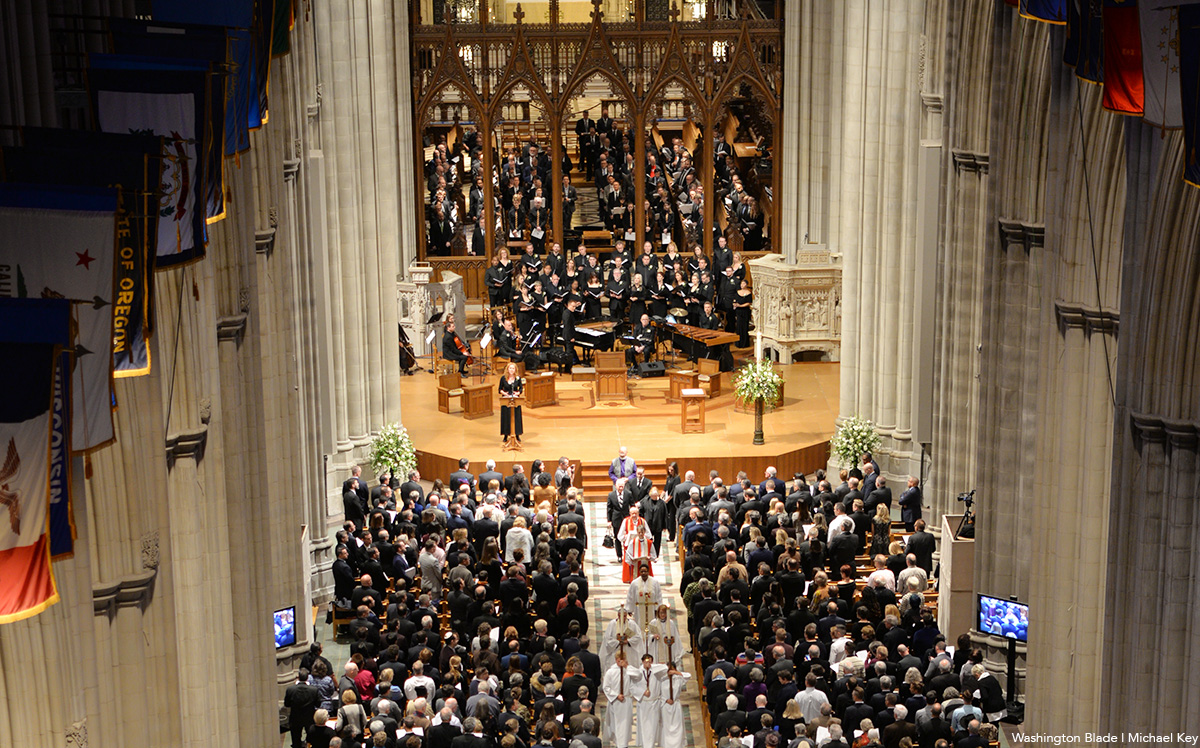
(Editor’s note: Although there has been considerable scholarship focused on LGBTQ community and advocacy in D.C., there is a deficit of scholarship focused on LGBTQ religion in the area. Religion plays an important role in LGBTQ advocacy movements, through queer-affirming ministers and communities, along with queer-phobic churches in the city. This is part two of a three-part series exploring the history of religion and LGBTQ advocacy in Washington, D.C.)
The Gay Liberation Front of DC previously organized a Gay Pride Week in 1972, by the efforts of Chuck Hall, Bruce Pennington, and Cade Ware. Deacon Maccubbin was still perplexed how Washington, D.C., which had a diverse gay scene, albeit a segregated one, did not have a large festival to gather together like that in New York. Together with former Gay Activists Alliance president Bob Carpenter, Maccubbin set out to plan a Pride event specific to the city, and on June 22, 1975, “Gay Pride Day” was the first officially recognized Pride celebration in D.C. The first Gay Pride Day was scheduled one week in advance of the Christopher Street Liberation Day parade in New York City so that LGBTQ D.C. residents could participate in that parade alongside others along the East Coast.
One year later, the timing sparked controversy because Gay Pride Day fell on June 20, also Father’s Day. John Wilson’s opponent in the Democratic primary election spoke out against Wilson’s support of holding Pride Day on the 20th. His opponent argued that Wilson was “an embarrassment to the city for introducing a Council resolution allowing Gay Pride Day to fall on Father’s Day.” Similarly William Stahr of Baltimore shared in a column in The Washington Star that the Council decision “is outrageously anti-social because the encouragement of homosexuality weakens society by undermining the family.”
LGBTQ community representative David L. Aiken wrote a letter back to the editor of The Washington Star on June 18, 1976 explaining the community’s decision.
“Gays do not threaten fatherhood, motherhood, or any other traditional values. Many people who are fathers or mothers have a realization that there is another side to their personality that can be expressed through gay love. The two are not mutually exclusive. What gay pride does challenge, however, is the bigoted assumption that heterosexual relations are the only kind about which it is polite to speak.”
Many Catholic priests in the area were upset that it fell on Father’s Day as well, which is celebrated in American Catholic churches with a special Mass that day, but the organizer of the second annual Gay Pride Day, Frank Akers, then a staff member at the Washington Blade, reported that the 1976 Gay Pride Day “was a success spiritually, if not financially.”
But the success of the 1976 Gay Pride Day was followed shortly after by the start of the HIV/AIDS pandemic. In the late 1970s, the HIV strain arrived in the United States and men who had sex with men were disproportionately affected. While LGBTQ individuals still faced intense persecution in secular and some religious spaces, the visibility of religiously motivated homophobia only grew and grew as conservative religious leaders like Anita Bryant and Jerry Falwell argued that HIV/AIDS was God’s punishment for the “promiscuity” of LGBTQ individuals. He made this especially clear in a discussion with MCC founder Troy Perry on July 6, 1983. Like many major cities, Washington, D.C. was hit hard but affirming organizations worked to provide care for LGBTQ people.
In 1982, D.C.’s MCC partnered with the Whitman-Walker Clinic, the NIH, MCC Baltimore, and Georgetown University Hospital to host one of the first AIDS forums in the nation (the event was held at the church). At a time when people were still weary of contact with HIV-positive individuals, water baptism was held by Faith Temple at Calvary Baptist Church in D.C. in 1986. This occurred at a time when many churches were not baptizing persons known or thought to be HIV positive or had AIDS. On Oct. 12, 1991, the NAMES Project Chapter and the Clergy Commission on AIDS coordinated the display of pieces of the AIDS Memorial Quilt at DMV churches, from St. Augustine Catholic Church to New Bethel Baptist Church to the National Cathedral.
The National Cathedral first began its ministry around HIV/AIDS in 1986, hosting a conference that same year to address how religion and religious communities can serve as allies and caregivers. The National Cathedral also displayed the quilt and organized services around the memorial in 1988, the year of the national tour of the Quilt, as well as in 1990, 1993, 1994, and 1996. Most recently, The Washington Cathedral also hosted the AIDS Memorial Quilt in July 2012, on the quilt’s 25th anniversary. From July 17-26, the Cathedral honored all those who died from AIDS and individuals who are living with HIV/AIDS. Dr. James Curran spoke during the interfaith memorial service at the Cathedral on Saturday, July 21.
However, at the same time, the Dignity chapter meeting at Georgetown University was forced to move to St. Margaret Episcopal Church after the Vatican released a letter by Cardinal Joseph Ratzinger claiming that LGBTQ individuals are “objectively disordered” in October 1986. Social and violent homophobia continued into the early 1990s, especially as focus on family rights were conflated with anti-LGBTQ legislation in the late 1980s. Another resurgence of family rights would occur in the late 2010s and early 2020s with the election of Donald Trump as president in 2016.
By the late 1990s and early 2000s, many more congregations were moving to become open and affirming. On Dec. 11, 2001, Bruce Pennington moderated a panel discussion “Creating Communities of Faith” featuring Faisal Alam, Jerry Goldberg, Andrew Hudson, Bob Miailovich, Dan Schellhorn, and Michael Vanzan. Ten years later, the DC Metropolitan Community Church celebrated 40 years of service to LGBTQ Washingtonians. As one of the first Metropolitan Community Churches in the DMV area, DC’s MCC was instrumental in founding the New Life MCC of Hampton Rocks, Norfolk, Va., in 1977, MCC of Northern Virginia, Oakton, Va., in 1981, Open Door MCC in Boyds, Md., in 1982, and Holy Redeemer MCC College Park, Md., in 1998.
That same year in 2011, Dignity/Washington hosted the National Convention of Dignity USA in D.C., during which four long-term Dignity couples from across the country were married by Dignity/Washington members under the new DC marriage equality laws. A number of other congregations also became actively involved in Capital Pride events, including the Cleveland Park UCC, First Congregational UCC, and Westmoreland UCC. The three groups hosted a UCC welcome book with other churches every year at the Capital Pride Festival up until the COVID-19 pandemic.
At the same time, new religious communities developed. Wiccan, neo-pagan, and pagan communities have long been spiritual refugees for LGBTQ communities, and pagan faith communities were first established in the DMV in the early 2010s. Also in 2011, Circle Sanctuary Ministers Jeanet and David Ewing founded the Potomac Circle Ministries in Northern Virginia to minister to pagans in the DMV area. In March 2013, Circle Sanctuary founder Rev. Selena Fox and other Circle Ministers attended the Marriage Equality rally in front of the U.S. Supreme Court, and she participated in the interfaith service at the Lutheran Church of the Reformation in Washington, DC. In November 2013, Jeanet and David Ewing performed a same-sex wedding in front of the Supreme Court in Washington, D.C.
What followed was a year of interfaith LGBTQ ministry in the DC area, which is celebrated every June with a Pride Interfaith Service held at a different DC worship space. The service is coordinated by DC Center Faith, the successor to the Celebration of the Spirit Coalition and the Washington Area Gay/Lesbian Interfaith Alliance which have been hosting interfaith services since 1983. In fact, much of the history of DC’s LGBTQ+ religious communities was recorded in November 2014 at an event organized by Center Faith called “Stepping Out” hosted at the Westminster Presbyterian Church, SW, D.C.
Center Faith partnered and still partners with Jewish, Christian, Muslim, Hindu, Sikh, Buddist, Unitarian universalist, Centers for Spiritual Living, Pagan, Wiccan, and Earth Religions faith communities who are supportive and inclusive of LGBTQ individuals. Through Center Faith, local faith leaders made strong connections through which they would gather and protest for LGBTQ rights. For example, faith leaders gathered together in front of the Supreme Court on Oct. 8, 2019 for the MoveOn Rally right as the Supreme Court heard a case that would overturn LGBTQ individuals’ right to work and allow employers to fire someone because they were LGBTQ.
Later into the 2010s, LGBTQ organizations exploring religion and humor came to be part of the D.C. area. The DC House of the Sisters of Perpetual Indulgence, “The Abbey of Magnificent Intentions” was approved by the United Nuns Privy Council in April 2016. Just as Deacon Maccubbin and David L. Aiken had done 30 years earlier, fighting back against conservative religious pushback to holding the Gay Pride Day on Father’s Day in 1976, the DC Sisters of Perpetual Indulgence came together on Oct. 8, 2022 to hold their fifth annual Lavender Mass — a counter event to the Red Mass. The Red Mass is a Catholic Mass held on the first Sunday of October to honor Catholics in positions of civil authority, like the Supreme Court Justices.
That Lavender Mass took place right before the March for Reproductive Rights following the overturn of Roe v. Wade in June 2022. This important moment in DC’s LGBTQ+ religious history will be explored next, reviewing the impact of this event right as the original founder of the Lavender Mass is stepping out of this role before moving out of the Capitol.
Emma Cieslik is presenting on LGBTQ+ Religion in the Capital at the DC History Conference on April 5. She is working with a DC History Fellow to establish a roundtable committed to recording and preserving this vital history. If you have any information about these histories, please reach out to Emma Cieslik at [email protected] or the Rainbow History Project at [email protected].
-

 LGBTQ Non-Profit Organizations5 days ago
LGBTQ Non-Profit Organizations5 days agoDay of [no] silence, a call to speak out against anti-LGBTQ+ hate
-

 Africa2 days ago
Africa2 days agoCongolese lawmaker introduces anti-homosexuality bill
-

 Colorado4 days ago
Colorado4 days agoFive transgender, nonbinary ICE detainees allege mistreatment at Colo. detention center
-

 Politics4 days ago
Politics4 days agoFirst lady warns Trump is ‘dangerous to the LGBTQ community’ at HRC event

